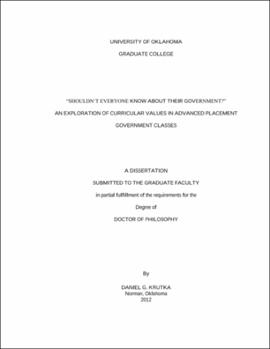| dc.description.abstract | Prevalent models of secondary education in the United States have tended to privilege the acquisition of knowledge of scientific disciplines that is often peripheral to the experiences of students. My Advanced Placement Government classes were no different, and this caused me to wonder whether my classes were meeting the often-stated goal of the social studies - citizenship education. This situation, along with anecdotal evidence of disconnection, led me to wonder what, if anything, my students were taking out of my classes. The purpose of this teacher action research study was to better understand what students found valuable in our AP Government classes. I used an interpretive framework and qualitative methodology to study the thoughts and actions of forty-four students, including how the transactional nature of our experiences interacted within our situation. Data collection involved the use of a Likert-scale survey, an open-ended questionnaire, field notes, and in-depth group and individual interviews. Findings indicated that students expressed that there was value in our course, and I categorized findings of value as primarily passive, academic, or active. The first two categories were more prominent in the findings and often revealed less of a connection to lived experiences. Other students communicated value in ways that actively connected content knowledge beyond the school setting. Students' reactions to some assignments helped me realize that we often had mismatched goals for the course, and this seemed to distance my students and me from better knowing each other. With these findings in mind, I conclude that we must create more spaces for educative experiences that might foster citizenship growth while cultivating situations where students and teachers may better know each other. | |
